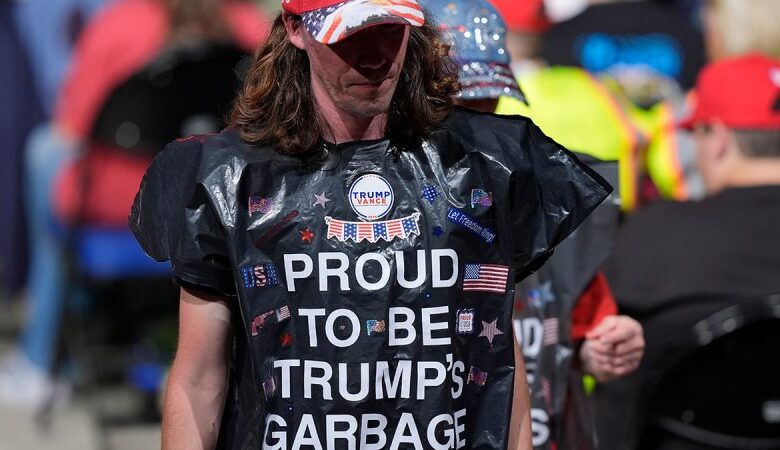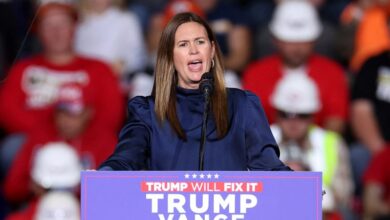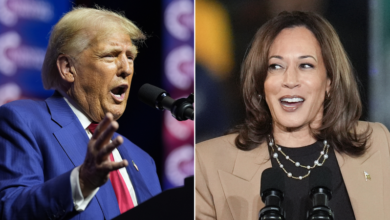JONATHAN TURLEY: Angry rhetoric is all the rage, but here’s to hope

When President Joe Biden took the podium in his hometown of Scranton, Pa., to campaign for Vice President Kamala Harris, many expected a return to the ‘self-professed unifier’ Biden from the 2020 election, particularly after his recent comments calling tens of millions of Trump supporters ‘garbage.’ If so, they were disappointed when it turned out to be the ‘take him behind the Gym’ Biden. Speaking through clenched teeth, Biden seethed that he wanted to ‘smack [Trump] in the ass.’ Even with the Harris campaign alarmed over his costly gaffes, Biden clearly could not resist the rage. He is not alone.
This entire election seems to be a type of political roid rage. In my book, ‘The Indispensable Right: Free Speech in an Age of Rage,‘ I discuss how rage rhetoric and rage politics have long been part of our history. Politicians will often intentionally trigger rage to rally voters not in support of their policies but in opposition to their opponents.
However, Biden’s seeming inability to keep his rage in check is a common feature of this rage politics. As I wrote in the book, ‘rage is liberating, even addictive. It allows us to say and do things that we would ordinarily avoid, even denounce in others.’ It is also contagious. Across the country, people are yelling at neighbors, tearing down signs, and even assaulting each other. What they are unwilling to admit is that they enjoy the rage. They like it.
As someone who has written about rage rhetoric and covered presidential elections for over two decades for different networks, I should be accustomed to these scenes. I am not. From the scenes outside of the Trump trial in Manhattan to the scenes outside of political rallies in Virginia, I find the rage depressing and deflating.
However, in flying to New York this weekend to join the Fox election coverage, I had a moment of real hope. I was driven to the airport by a man who told me that he was just months from his citizenship and how he and his wife were so thankful to soon be U.S. citizens. He came from a MiddleEastern nation where he long admired the United States for its freedoms, particularly the freedom of speech. Indeed, in his home country, he constantly ran into trouble with his government and was warned by his imam that he had to stop acting ‘like an American’ by speaking his mind.
He could not shut up, so he decided to become an American instead.
He then told me how confused he and his wife are by this election. They love the United States and cannot understand why people are so hateful and angry. ‘It is like they do not understand what they have here,’ he noted.
Listening to him over the course of our ride, I started to feel something that I had not felt in a while: real hope.
Sometimes, our truest citizens are found among our newest converts. As I discuss in my book, the problem with our democracy is that most citizens grew up in a nation where basic rights like the freedom of speech are guaranteed. They have never known the absence of such rights. This man and his wife have. They were not born here. They had to escape their country at great peril and cost to become U.S. citizens. They chose us and what we stand for.
They follow other great Americans drawn to these shores by something unique about this country. One was Tom Paine. The man who was credited with rallying a nation behind a revolution only landed upon these shores two years before the Declaration of Independence. His rocketing to fame with the publication of Common Sense enraged some, like John Adams, who viewed him as an unkempt, unknown rabble-rouser.
Yet, it was precisely Paine’s immigration that gave his words such clarity and power. He saw this emerging nation as unique for all of humanity, a nation where citizens could live free without the calcified social, economic, and political limits of the Old World. His voice resonated with this nation because it was so genuine and authentic.
I heard that same voice on my way to the airport. Sometimes, it takes the newest among us to remind us who we are to not only the rest of the world but also to each other.
I do not know what is coming out of that gate on election night. I have been there before. However, half of this country is going to be very, very upset either way this goes. What we need to struggle to remember is that this election does not define us. The rage does not define us. We defined ourselves almost 250 years ago and do so every day that new citizens like my new friend come to these shores. There is hope in who we are . . . even if we forget sometimes.




